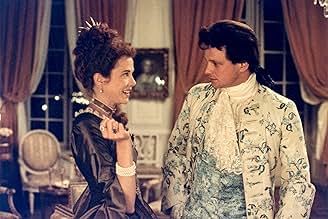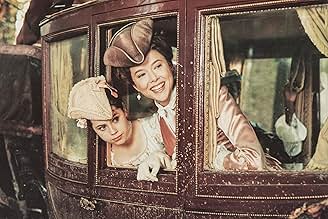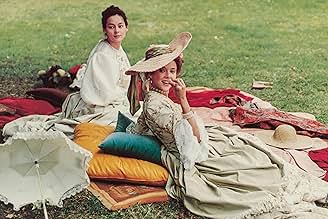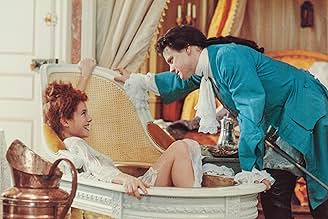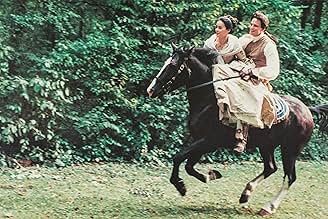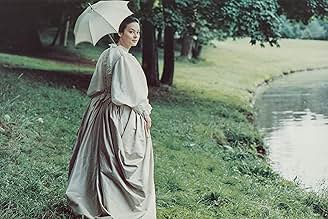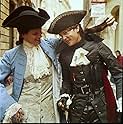IMDb-BEWERTUNG
7,0/10
14.998
IHRE BEWERTUNG
Die Witwe Marquise möchte verhindert, dass ihr Geliebter Gercourt ihre 15-jährige Cousine heiratet. Sie bittet einen Ex-Geliebten dafür ihr zu helfen. Doch der hat anderes im Sinn...Die Witwe Marquise möchte verhindert, dass ihr Geliebter Gercourt ihre 15-jährige Cousine heiratet. Sie bittet einen Ex-Geliebten dafür ihr zu helfen. Doch der hat anderes im Sinn...Die Witwe Marquise möchte verhindert, dass ihr Geliebter Gercourt ihre 15-jährige Cousine heiratet. Sie bittet einen Ex-Geliebten dafür ihr zu helfen. Doch der hat anderes im Sinn...
- Regie
- Drehbuch
- Hauptbesetzung
- Für 1 Oscar nominiert
- 3 Gewinne & 5 Nominierungen insgesamt
Siân Phillips
- Madame de Volanges
- (as Sian Phillips)
Sébastien Floche
- Priest
- (as Sebastien Floche)
Empfohlene Bewertungen
Milos Forman's version of 'Dangerous Liasons' was relegated to the second tier at the time of its release, which occurred close on the heels of Stephen Frears' version starring Glenn Close and John Malkovitch. I saw them both in the theatre when they were released and from the start enjoyed Forman's film far more than Frears'.
Annette Beining is a wonderful Madame de Mertueil, beautiful, intelligent, ruthless and in the end tragic. Glenn Close is pretty two-dimensional by comparison for Frears. And Colin Firth is more the laughing cavalier, with a heart, than was John Malkovitch for Frears, who mostly grimaces smugly and is highly distasteful and ego-centric. I liked Firth's sense of humor about himself, it makes the ending more poignant.
On paper some of the casting of Forman's version seems questionable, but all, except one, work very well. Most surprising was Henry Thomas's young lover. Thomas can be a dull actor but his reticent performance is apt for the gauche young man learning the ropes of 18th century Parisian society. Fairuza Bulk is delightful and funny as the virginal Céline. The supporting cast, notably Fabia Drake's dotty old Madame de Rosemond, are excellent. Siân Philips and Jeffrey Jones provide some very funny moments, though their characters are anything but "funny".
Only Meg Tilly falls short. Her American accent and modern delivery of the lines is disappointing. But she is a good actress and manages to convince in the end, though a more "Frenchified" performer would have served the story more effectively.
The music, cinematography and choreography are superb. The settings are very beautiful.
Forman's 'Valmont' deserves to be reconsidered by those critics who found it lacking when it first appeared.
Annette Beining is a wonderful Madame de Mertueil, beautiful, intelligent, ruthless and in the end tragic. Glenn Close is pretty two-dimensional by comparison for Frears. And Colin Firth is more the laughing cavalier, with a heart, than was John Malkovitch for Frears, who mostly grimaces smugly and is highly distasteful and ego-centric. I liked Firth's sense of humor about himself, it makes the ending more poignant.
On paper some of the casting of Forman's version seems questionable, but all, except one, work very well. Most surprising was Henry Thomas's young lover. Thomas can be a dull actor but his reticent performance is apt for the gauche young man learning the ropes of 18th century Parisian society. Fairuza Bulk is delightful and funny as the virginal Céline. The supporting cast, notably Fabia Drake's dotty old Madame de Rosemond, are excellent. Siân Philips and Jeffrey Jones provide some very funny moments, though their characters are anything but "funny".
Only Meg Tilly falls short. Her American accent and modern delivery of the lines is disappointing. But she is a good actress and manages to convince in the end, though a more "Frenchified" performer would have served the story more effectively.
The music, cinematography and choreography are superb. The settings are very beautiful.
Forman's 'Valmont' deserves to be reconsidered by those critics who found it lacking when it first appeared.
Milos Forman's Valmont is ultimately no better and no worse an adaptation of Les Liaisons Dangereuse than Dangerous Liaisons by Stephen Frears which made it into theaters months earlier. Both are entertaining, yet both dip into tedium around the three-quarter point because the web of aristocratic intrigues they are following gets too tangled for a two-hour screen treatment.
"Valmont" occupies a wider canvas which encompasses visual reminders that the privileged central characters live amidst a largely impoverished society. As soon as horse-drawn carriage gallops away from palace or mansion, the squalid reality of the streets of Paris is revealed. Frears's "DL" is able to show the same difference by closing in on relationships such as the intimate master-servant morning rituals that open his film. Forman's "Valmont" humanizes the main characters by toning down their cruelty and blunting their extremes. By contrast, in "DL" Glenn Close plays the Comtesse de Merteuil with a cold reserve that dissolves into hysteria whereas Annette Bening in "V" exudes a high-wattage, tightly controlled gaiety which remains more or less constant throughout. Colin Firth's Valmont is more dashing and virile than John Malkovich's, but his performance lacks the corrupt menace which Malkovich provides in overly strong doses. Firth's seduction of the young Cecile (Fairuza Balk), is brilliantly conceived, staged and performed. Meg Tilly as Mme. De Tourvel has a simplicity and vulnerability that eluded Michelle Pfeiffer in DL, and Tilly doesn't strain for effects. She and Firth are also a better physical match, and the development of their relationship makes more sense here. Henry Thomas as the music tutor in love with young Cecile has much more screen time than Keanu Reeves in DL, which is all for the better because he has the acting chops to pull it off – a 17-year-old with more principles and purity than all of the adults in his orbit combined. Whereas "Valmont" is a diffuse and leisurely satire, DL is a highly stylized tragedy.
"Valmont" occupies a wider canvas which encompasses visual reminders that the privileged central characters live amidst a largely impoverished society. As soon as horse-drawn carriage gallops away from palace or mansion, the squalid reality of the streets of Paris is revealed. Frears's "DL" is able to show the same difference by closing in on relationships such as the intimate master-servant morning rituals that open his film. Forman's "Valmont" humanizes the main characters by toning down their cruelty and blunting their extremes. By contrast, in "DL" Glenn Close plays the Comtesse de Merteuil with a cold reserve that dissolves into hysteria whereas Annette Bening in "V" exudes a high-wattage, tightly controlled gaiety which remains more or less constant throughout. Colin Firth's Valmont is more dashing and virile than John Malkovich's, but his performance lacks the corrupt menace which Malkovich provides in overly strong doses. Firth's seduction of the young Cecile (Fairuza Balk), is brilliantly conceived, staged and performed. Meg Tilly as Mme. De Tourvel has a simplicity and vulnerability that eluded Michelle Pfeiffer in DL, and Tilly doesn't strain for effects. She and Firth are also a better physical match, and the development of their relationship makes more sense here. Henry Thomas as the music tutor in love with young Cecile has much more screen time than Keanu Reeves in DL, which is all for the better because he has the acting chops to pull it off – a 17-year-old with more principles and purity than all of the adults in his orbit combined. Whereas "Valmont" is a diffuse and leisurely satire, DL is a highly stylized tragedy.
I just watched "Valmont" just now actually, and what can I say, I was really impressed with the film... I've seen "Dangerous Liason" so many times before, and it's always been one of my favorites, so maybe that's why I was a bit skeptical about "Valmont" as it started (for me it was overshadowed by "Dangerous Liason", but it was quick for me to be proven wrong...) The film was great, very interesting, because it provided different insight into the the story. Colin Firth (who I've fallen in love with ever since I watched "Bridget Jones' Diary, because he is one charming brit!) was dazzling as Valmont, and he managed to display another kind of Valmont, which John Malkovich wasn't, but he was great as well. Firth's Valmont was very charming and he has a passion and charisma to him that Malkovich lacked (he was overall rather "cool"), and what can i say? He just took my breath away again once again. Annette Bening (is that how u spell her name?) was also brilliant, and in the begining I was tricked into thinking that she was too nice for the part, but nope, she was evil as well, and maybe to some extent more evil that Glenn Close's portryal, because beneath all the nice and sweetness, beining was evil indeed! and Henry Thomas, he was extroidinary, and he did a great job! His potrayal of his character was so much better than Keanu Reeves (who can't act), and he made the movie interesting indeed. it was sad to see his innocence lost at the end though, what really disturbed me, because before he was such a loyal lover! sad, the loss of innocence, once it's gone, it never comes back...maybe "Valmont" is lacking in the sense that it failed to illustrate the importance of Madame de Tourvel, like "Dangerous Liason" did, but otherwise, Valmont is magnificent. passionate, fun, and definetly keeps you going!
I liked this better than Dangerous Liaisons which came out at about the same time. Of course Dangerous Liaisons was very good, and John Malkovich, who played Vicomte de Valmont, is an actor of power, and Glenn Close, who played the Marquise de Merteuil, is highly accomplished, but I preferred the charm of Colin Firth in this film to the brutality of Malkovich, and I thought Annette Bening was just delightful. She played Merteuil with exquisite timing and an ironic witchery and warmth that I shall not soon forget. I preferred her playful, sly wit to Close's cool cynicism.
The story comes from a novel by Choderlos de Laclos set in 18th century France that was made into a stage play by Christopher Hampton. It is a cynical satire on human sexuality as well as a very subtle examination of sexual hypocrisy and desire, a kind of oh so sophisticated laugh at bourgeois morality that would have delighted Voltaire and Moliere and greatly amused Shakespeare. It is a tale of elaborate lechery and revenge that backfires because it seems that anybody, even the most jagged rake can fall in love, and thereby become the victim. The central assumption here is the same as that of the Cavalier poets, namely that marriage kills love. As Merteuil says, "You don't marry your lover."
Meg Tilly played Madame de Tourvel with subtlety and a riveting passion. One of the great sequences in the movie occurs after she has fallen madly in love with Valmont against her will. She stands outside his doorway in the rain for hours looking adoringly and forlornly up at his window. And then she is allowed to enter and receive a cool reception. Valmont says, "Do you want me to lie to you?" and she replies desperately, "Yes," and then it is her passion that overwhelms him, leading to a beautifully ironic twist. Shortly afterward he sees Merteuil, who has become more like a sister than an ex-lover, and says, "I feel awful." She replies, "Are you surprised? (Pause) You are an awful man." Hanging his head he continues, "Do you think a man can change?" "Yes. (Pause) For the worse."
This theme, that it is the beloved who has the power and that once you fall in love you lose all power, is repeated several times in the movie. Valmont pursues women, the harder to get the better, with a relentless and maniacal passion, but once he has them, he immediately loses interest. His making love absentmindedly to Cecile de Volanges (played with wide-eyed innocence and girlish charm by Fairuza Balk) was an incredible irony when we consider what she would cost Gercourt, played with his rather substantial nose in the air by Jeffrey Jones, whom you may recall as the pratfalling principal in Ferris Bueller's Day Off (1986).
There is some insidious philosophy here, some sardonic observations on human nature worth mentioning. One is that the man beloved of women gets most of the reproductive tries, and regardless of his rakishness, is still beloved. Another is that duplicity is the accepted, even required, standard of behavior in society, and that when it comes to sex, one must, perforce, always lie.
Milos Forman's direction was invisible and therefore a work of art. The incidental scenes and backdrops depicting the color, squalor and decadence of pre-revolutionary France added just the right amount of atmosphere. The costumes were stunning and much cleaner than they would have been in reality. The elegance and beauty of all the titled people merrily contrasted with the crude ugliness of the common people, rightly reflecting the effete snobbery of the aristocracy before the time of the guillotine.
(Note: Over 500 of my movie reviews are now available in my book "Cut to the Chaise Lounge or I Can't Believe I Swallowed the Remote!" Get it at Amazon!)
The story comes from a novel by Choderlos de Laclos set in 18th century France that was made into a stage play by Christopher Hampton. It is a cynical satire on human sexuality as well as a very subtle examination of sexual hypocrisy and desire, a kind of oh so sophisticated laugh at bourgeois morality that would have delighted Voltaire and Moliere and greatly amused Shakespeare. It is a tale of elaborate lechery and revenge that backfires because it seems that anybody, even the most jagged rake can fall in love, and thereby become the victim. The central assumption here is the same as that of the Cavalier poets, namely that marriage kills love. As Merteuil says, "You don't marry your lover."
Meg Tilly played Madame de Tourvel with subtlety and a riveting passion. One of the great sequences in the movie occurs after she has fallen madly in love with Valmont against her will. She stands outside his doorway in the rain for hours looking adoringly and forlornly up at his window. And then she is allowed to enter and receive a cool reception. Valmont says, "Do you want me to lie to you?" and she replies desperately, "Yes," and then it is her passion that overwhelms him, leading to a beautifully ironic twist. Shortly afterward he sees Merteuil, who has become more like a sister than an ex-lover, and says, "I feel awful." She replies, "Are you surprised? (Pause) You are an awful man." Hanging his head he continues, "Do you think a man can change?" "Yes. (Pause) For the worse."
This theme, that it is the beloved who has the power and that once you fall in love you lose all power, is repeated several times in the movie. Valmont pursues women, the harder to get the better, with a relentless and maniacal passion, but once he has them, he immediately loses interest. His making love absentmindedly to Cecile de Volanges (played with wide-eyed innocence and girlish charm by Fairuza Balk) was an incredible irony when we consider what she would cost Gercourt, played with his rather substantial nose in the air by Jeffrey Jones, whom you may recall as the pratfalling principal in Ferris Bueller's Day Off (1986).
There is some insidious philosophy here, some sardonic observations on human nature worth mentioning. One is that the man beloved of women gets most of the reproductive tries, and regardless of his rakishness, is still beloved. Another is that duplicity is the accepted, even required, standard of behavior in society, and that when it comes to sex, one must, perforce, always lie.
Milos Forman's direction was invisible and therefore a work of art. The incidental scenes and backdrops depicting the color, squalor and decadence of pre-revolutionary France added just the right amount of atmosphere. The costumes were stunning and much cleaner than they would have been in reality. The elegance and beauty of all the titled people merrily contrasted with the crude ugliness of the common people, rightly reflecting the effete snobbery of the aristocracy before the time of the guillotine.
(Note: Over 500 of my movie reviews are now available in my book "Cut to the Chaise Lounge or I Can't Believe I Swallowed the Remote!" Get it at Amazon!)
'Valmont' was overshadowed by the popularity of 'Dangerous Liaisons' which released just about a year before. Both movies were based on the same novel. It has been too long since I last watched 'Dangerous Liaisons'. I remember the ending being slightly different and the acting a little more dramatic.
'Valmont' solidly makes its own stand. Milos Forman gives it a slightly larger than life look with the colourful lavish sets and exquisite costumes but he balances it wonderfully with the actors' subtle performances, a beautiful soundtrack and stunning cinematography.
Forman tells the story very well. Even though I had a vague idea of what it was about, I liked Forman's presentation and he still managed to surprise me a few times. 'Valmont' brings forth some strong themes, such as that of love, seduction, lust, sexuality, marriage, chastity, monogamy and envy. All themes are brilliantly incorporated into the story and characters. Additionally , the viewer delightfully benefits from some splendid lines, especially the dialogue delivered between Annette Bening and Colin Firth. Their sequences along with the one where a soaking wet Meg Tilly asks Valmont to love her and a dance number where Valmont dances with four women are some of the most memorable movie moments.
Needless to say, each and every one of the performances are first rate. I couldn't picture anyone else other than Colin Firth in Valmont's shoes. He plays the part naturally, fitting it like a comfortable glove. Annette Bening is delightful as the playfully wicked baroness. Meg Tilly is wonderful as Tourvel. Fairuza Balk is a great choice as she possesses the innocence, naivety and youthfulness of Cecile.
Valmont is definitely not your average costume drama. While it tells an engaging story on human relationships, it raises some interesting questions on the aforementioned themes, questions that hold strongly relevant for today's world too. It's a stunning cinematic piece.
'Valmont' solidly makes its own stand. Milos Forman gives it a slightly larger than life look with the colourful lavish sets and exquisite costumes but he balances it wonderfully with the actors' subtle performances, a beautiful soundtrack and stunning cinematography.
Forman tells the story very well. Even though I had a vague idea of what it was about, I liked Forman's presentation and he still managed to surprise me a few times. 'Valmont' brings forth some strong themes, such as that of love, seduction, lust, sexuality, marriage, chastity, monogamy and envy. All themes are brilliantly incorporated into the story and characters. Additionally , the viewer delightfully benefits from some splendid lines, especially the dialogue delivered between Annette Bening and Colin Firth. Their sequences along with the one where a soaking wet Meg Tilly asks Valmont to love her and a dance number where Valmont dances with four women are some of the most memorable movie moments.
Needless to say, each and every one of the performances are first rate. I couldn't picture anyone else other than Colin Firth in Valmont's shoes. He plays the part naturally, fitting it like a comfortable glove. Annette Bening is delightful as the playfully wicked baroness. Meg Tilly is wonderful as Tourvel. Fairuza Balk is a great choice as she possesses the innocence, naivety and youthfulness of Cecile.
Valmont is definitely not your average costume drama. While it tells an engaging story on human relationships, it raises some interesting questions on the aforementioned themes, questions that hold strongly relevant for today's world too. It's a stunning cinematic piece.
Wusstest du schon
- WissenswertesMeg Tilly and Colin Firth fell in love while they were making the film. A year later they had a son together.
- PatzerWhen Tourvel is in the market, she places several food items in her basket one after the other. However, every time she does so, the basket appears empty even though she had just placed something in it a moment before.
- SoundtracksDivertimento for Winds in B Flat Major, K240
Wolfgang Amadeus Mozart
Performed by the orchestra of the The Academy of St. Martin-in-the-Fields
Top-Auswahl
Melde dich zum Bewerten an und greife auf die Watchlist für personalisierte Empfehlungen zu.
- How long is Valmont?Powered by Alexa
Details
- Erscheinungsdatum
- Herkunftsländer
- Sprache
- Auch bekannt als
- Valmont. Relaciones peligrosas
- Drehorte
- Château de la Motte-Tilly, Nogent-sur-Seine, Aube, Frankreich(Madame de Rosemonde's estate)
- Produktionsfirmen
- Weitere beteiligte Unternehmen bei IMDbPro anzeigen
Box Office
- Budget
- 33.000.000 $ (geschätzt)
- Bruttoertrag in den USA und Kanada
- 1.132.112 $
- Eröffnungswochenende in den USA und in Kanada
- 96.008 $
- 19. Nov. 1989
- Weltweiter Bruttoertrag
- 1.132.112 $
- Laufzeit
- 2 Std. 17 Min.(137 min)
- Farbe
- Seitenverhältnis
- 2.39 : 1
Zu dieser Seite beitragen
Bearbeitung vorschlagen oder fehlenden Inhalt hinzufügen






